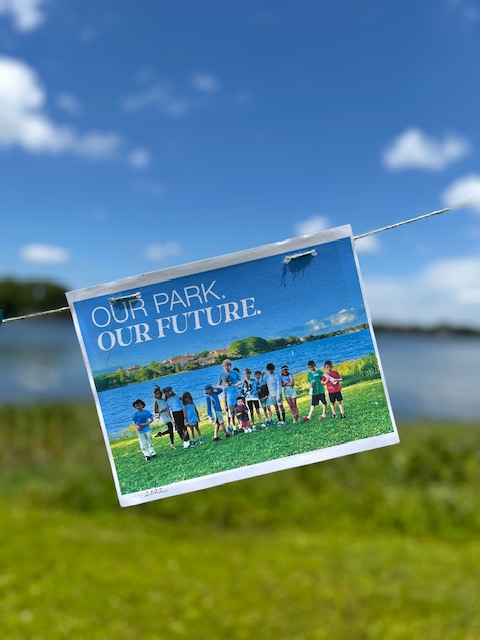
by Beth Kassab | Jan 21, 2026 | Uncategorized
Homeowners Continue Fight in Court Against Virginia Heights Neighbor Over Private Park
At stake, is the use of a shared lakefront lot some residents use to launch kayaks or picnic. The homeowners next to the park want to limit when and how the land is used.
Jan. 21, 2026
By Gabrielle Russon
A neighborhood squabble over a private Lake Virginia park is escalating in court.
Eric and Diane Holm and Brian and Caryn Albertson sued their Virginia Heights neighbor Stephanie Guss over “filthy” kayaks and other complaints about the lakefront neighborhood park that sits between their homes.
The lawsuit was filed in April, but Guss was not served until just before Thanksgiving after Orange Circuit Court Judge Lisa Munyon ordered the lawsuit would be dismissed if the Holms and Albertsons didn’t take action.
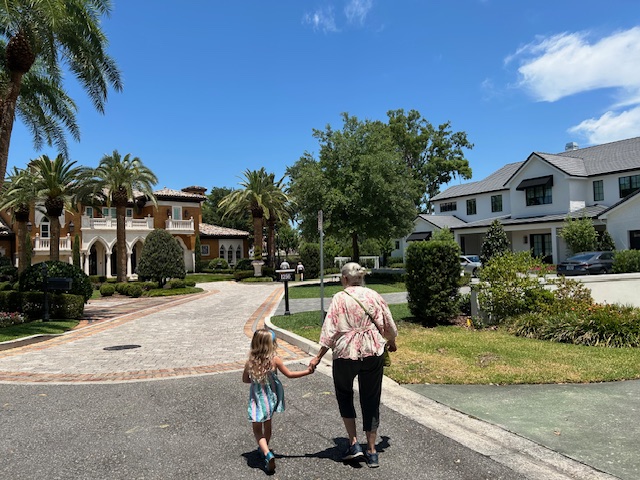
A woman and child walk to the private neighborhood park. The access point may appear to be on private property, but there’s a walkway to the shared lot deeded to Virginia Heights residents.
Since then, neighbors have quietly raised more than $10,000 to help with Guss’ legal bills.
So far, no court hearings have been set on the legal fight in one of Winter Park’s oldest neighborhoods where the park has been a beloved site for community gatherings.
At stake, is how much access neighbors have to the land platted 100 years ago to give residents who don’t own lake lots a spot to launch kayaks, hold picnics or otherwise enjoy views of Lake Virginia, part of Winter Park’s picturesque chain of lakes.
Several neighbors supporting Guss declined to comment for this story because they said they feared they would be sued next.
“Their suit is in essence, only a thinly veiled attempt at asserting a view right over the park — a right they do not possess. The choice of the Holms and Albertsons to pursue litigation over cooperation has devastated the Virginia Heights community,” they wrote in an unsigned letter to the Winter Park Voice. “The result is a culture of fear and intimidation in a once neighborly community.”
But the Holms and Albertsons, who also declined to be interviewed, said in a written statement their lawsuit’s goal “is to get clear, workable guidance that everyone can follow in 2026—so deeded homeowners can enjoy the park while the adjacent homes can maintain reasonable privacy and security.”
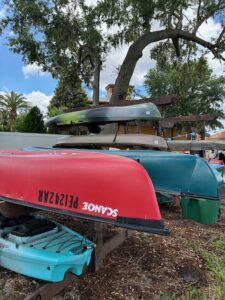
Kayaks are stored on a rack in the private park on Lake Virginia.
The two families said they want better signs to keep the public out of the park and daylight park hours only. They also would like all boats and personal storage out so “the park isn’t treated as a storage area and so rules are consistent and transparent for everyone.”
“We consider ourselves respectful neighbors, and we’re asking for the same respect in return — especially given the park’s immediate proximity to two backyards,” the two families said in a statement.
Holm, a major Republican donor who has hosted Vice President J.D. Vance for lunch at his home and a philanthropist who operates multiple Golden Corral, Peach Valley Cafe and Jersey Mike’s Subs locations, bought his property in 2008 for $3.1 million. Albertson paid $3.1 million for his property in 2020 and built his house in 2024.
But the neighbors argued they held a community meeting in September and agreed to make several improvements. They said they were blindsided when Guss was served with the lawsuit two months later.
“Virginia Heights has responded not with anger, but with resolve,” the neighbors said in the unsigned statement. “We remain open to good-faith discussions about park management, safety protocols, and maintenance responsibilities. … But dialogue requires mutual respect and a genuine willingness to work together, not ultimatums backed by legal threats.”
“We believe shared spaces should be managed for the benefit of all, not redesigned to favor two households.”
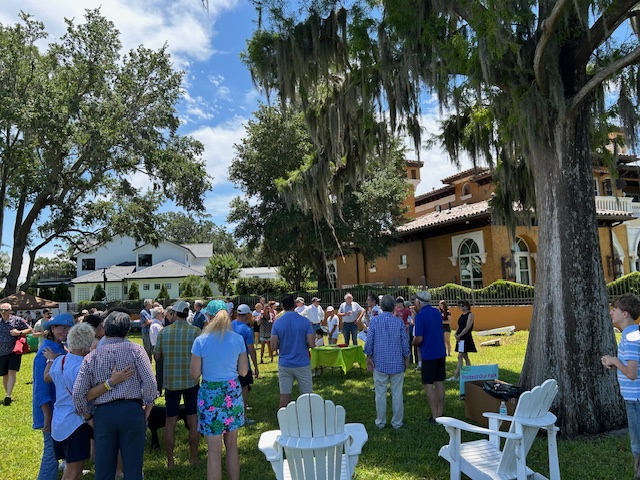
Neighbors gathered last year at the park with homes belonging to Brian Albertson and Eric Holm in the background.
In the April lawsuit, the Holms and Albertsons said neighborhood residents left about 30 kayaks, lifejackets and oars to take up space in the storage racks at the park.
“Many of the kayaks in and around the Racks are filthy, showing no signs of use within the last year or more and are covered in dust, dirt, and mildew,” the lawsuit said.
The Holms and Albertsons also said bushes had been planted at the park “for the sole purpose of interfering with Plaintiffs’ use and enjoyment of their properties,” the lawsuit said, adding they also saw someone doing drugs in the park.
The neighbors downplayed the Holms’ and Albertsons’ allegations raised in the April lawsuit.
“The ironies are striking: claims of safety concerns that have never been reported to police; demands to remove ‘filthy’ kayaks that families use regularly; assertions that trees planted to protect shoreline ecology are ‘obstructions’; suggestions that a gate and limited hours would somehow improve community access,” they wrote in their letter.
Guss, who was named in the litigation because she helped with the boat rack inquiries, also declined to be interviewed for this story.
“Plaintiffs believe that Defendant has co-conspirators that are yet-to-be-identified members of the community,” the April lawsuit said.
The Holms and Albertsons also unsuccessfully sued Guss in 2024 to find out the kayak owners’ names.
Both sides in the neighborhood fight also believe a 1971 court order could help their case. The court judgement ordered the former owners of the properties now occupied by Holm and Albertson to take down wire fencing and landscaping they put in the park after they were challenged by Virginia Heights residents.
“It’s more than 50 years old, and people in the neighborhood interpret it differently,” Holm said in an email. “The only way to get clarity—and to make sure everyone is working from the same rules—is to obtain an updated, definitive order from the court.”
WinterParkVoiceEditor@gmail.com
To comment or read comments from others, click here →
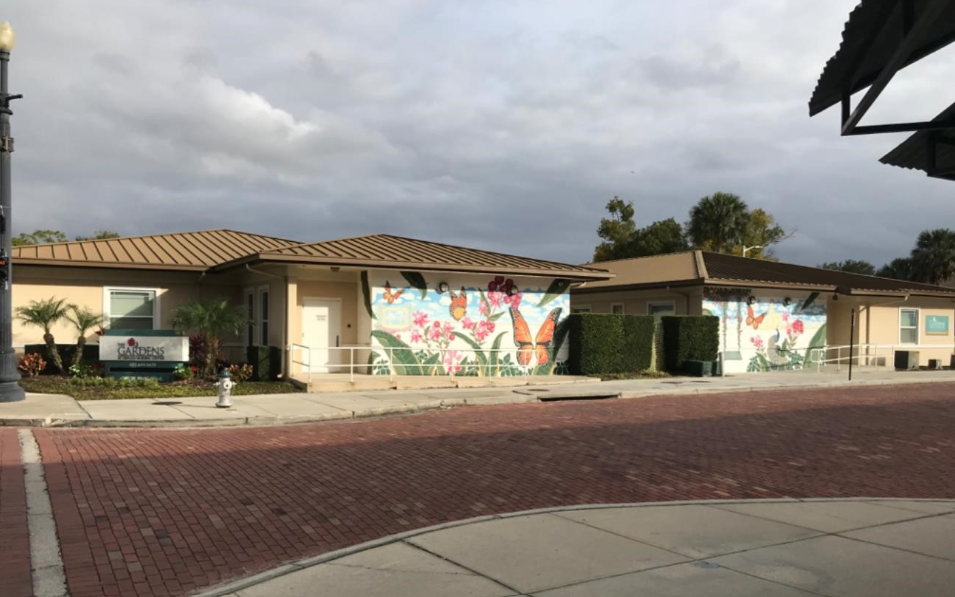
by Beth Kassab | Jan 15, 2026 | Uncategorized
DePugh Nursing Center Sold for $5.4 Million
The money will go to the Elizabeth Morse Genius Foundation to fund other local needs
Jan. 15, 2026
By Beth Kassab
Zane Williams paid $5.4 million for the Gardens at DePugh Nursing Center and the dollars will go to the Elizabeth Morse Genius Foundation to fund charitable causes.
Rick Baldwin, who served as chairman of DePugh’s board of directors, said the nursing center association will be dissolved and the money from the sale will help support other local needs through the foundation.
Baldwin, who also serves as a trustee at the Morse Genius Foundation, did not confirm the sale price, which was listed on records for the Orange County Property Appraiser.
The new owner of the 1.7 acre property at 550 W. Morse Blvd is listed as Z 17, LLC, a company registered to Williams at the address of Z Properties.
Williams, who last week announced plans for a mixed-use development on the site, did not immediately respond to a request for comment about the sale and how the proceeds will be used.
Baldwin said the Morse Genius Foundation supported the DePugh center over the years and he felt comfortable that it would also responsibly use the proceeds from the sale to fund other needs.
“Our mission was to take care of the less fortunate,” Baldwin said of DePugh, noting that mission aligns with the foundation’s history of giving.
According to its website, the foundation has also supported arts groups such as the local ballet and opera along with Rollins College, the University of Central Florida’s nursing college and social services groups such as the Boys and Girls Club, Grace Medical Home and others, including the Welbourne Nursery and Preschool in Winter Park and Winter Park Day Nursery.
The new development at the DePugh site will bring further change for the historically Black neighborhood west of Park Avenue that dates back to the city’s founding. The area has undergone significant gentrification over the past 25 years with the redevelopment of Hannibal Square and a number of larger homes replacing small, single-story houses.
The DePugh center opened in 1956 as the first state-approved nursing home where aging Black residents could seek care during segregation. The center was named for Mary Lee DePugh, who moved to Winter Park in 1937 to work for a white family she knew from the Chicago area and began advocating to provide health care to those in need as part of her work with the Ideal Woman’s Club, which she founded on the west side of the city. She died before the center opened.
Baldwin said he remains saddened by DePugh’s closure last year.
“I hate it that the nursing home had to close but you can pick up the paper every day and see what’s happening to Medicaid,” he said.
Medicaid didn’t even cover half of a day’s care for residents by the time the center closed, he said.
“It just wasn’t sustainable the way they cut all those reimbursements,” he said. “We tried for years. It’s heartbreaking, but I know it’s happening all over the country, it’s not just here.”
WinterParkVoiceEditor@gmail.com
To comment or read comments from others, click here →

by Beth Kassab | Jan 15, 2026 | Arts and Culture, City Commission, News, Police and Public Safety, Schools
Have Complaints about Electric Scooters and Bikes? Meeting Scheduled for Next Month
Plus Blue Bamboo’s leader offered a short update on the group’s financial status in the wake of multiple changes at the organization operating at the city’s old library
Jan. 15, 2026
By Beth Kassab
Residents who have questions or concerns about safety related to electric bikes and scooters, which have soared in popularity in recent years, are invited to attend a community meeting at Winter Park Community Center on Feb. 17 at 5:30 p.m.
The meeting comes in the wake of a rising number of accidents and concerns surrounding the motorized devices that are increasingly common in and around school campuses.
Commissioner Craig Russell, who is also a teacher and coach at Winter Park High School, has taken the lead on the topic with a series of safety videos aimed at students and parents and, now, plans for a larger community discussion.
Russell said at Wednesday’s City Commission session that the meeting in February will be about sharing the facts and providing any available updates on the Legislative session, where a proposal (HB 243 and SB 382) is being debated that would put more regulations on e-bikes and scooters and their often young drivers.
“I just want to continue with our public safety effort,” Russell said. “It’s not going to be me telling parents what to do. It’s an informational session.”
The Voice reported last month that Orange County School Board members tossed around potential new regulations such as requiring licenses, training and speed limits at a meeting in November.
Since 2017, electric scooter injuries in the U.S. have surged by 400%, with Florida being a top state in emergency room visits for such injuries, staff told board members, citing data from the Consumer Product Safety Commission. These accidents have more than doubled since 2023 for children under 15.
Update on Blue Bamboo
Commissioners heard an update on Wednesday from Jeff Flowers, who is leading the Blue Bamboo Center for the Arts project that is leasing the city’s old library building.
The group’s founder Chris Cortez died last month after a short illness with glioblastoma, the most aggressive form of brain cancer.
Flowers, a chemist and arts philanthropist who served two stints on the Maitland City Council, noted the challenges the group has faced with the loss of Cortez and difficulty finding tenants for the second and third floors of the building. He said there have been three “very serious” sublease prospects, but no deals yet.
“We are in serious discussions now with another,” he said. “It’s not there yet, but it looks good.”
He said the Blue Bamboo tallied 8,300 people attending shows over the past six months and $180,000 in ticket sales. He said revenue totaled about $340,000 including concession sales and donations.
The Blue Bamboo is required to pay the city $132,000 a year in rent for the building, an amount scheduled to rise to $276,000 next year, according to the lease agreement.
The group has access to a $900,000 grant from Orange County for additional work on the building, but is required to raise matching funds and was counting on help in the form of fundraising and rent from Central Florida Vocal Arts before that group walked away from the deal in August when it was not satisfied by the terms of the sublease offered by Blue Bamboo.
Flowers has loaned Blue Bamboo more than $1 million so far to retrofit the first floor of the building into a performance space and other work.
“The message is look, the Blue Bamboo is here to stay,” Flowers told the commission. “We’ve surmounted every barrier thrown at us.”
Mayor Sheila DeCiccio thanked Flowers for appearing at the meeting and quickly moved on to the next topic after no other commissioners offered any comments or asked any questions.
WinterParkVoiceEditor@gmail.com
CORRECTION: The original version of this story included the wrong location and time for the meeting on e-bikes and scooters. The meeting will be held at Winter Park Community Center at 5:30 p.m.
To comment or read comments from others, click here →
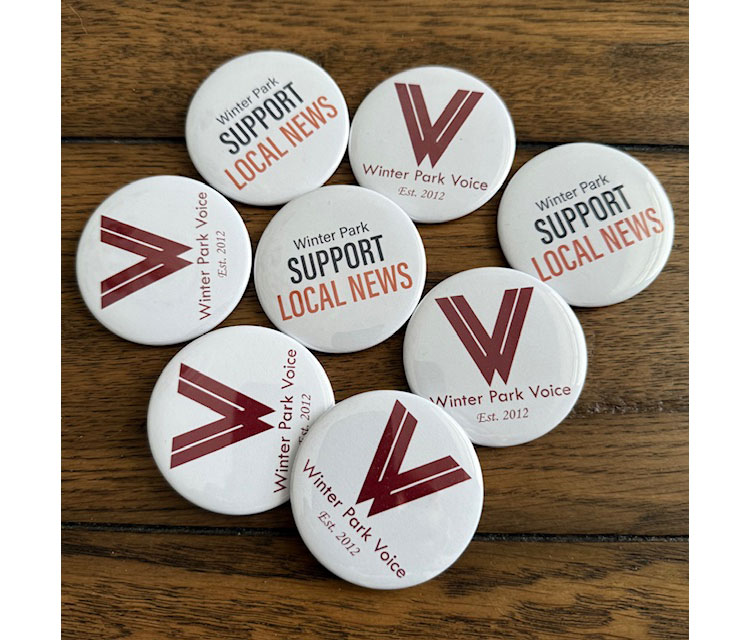
by Beth Kassab | Jan 13, 2026 | Election, News
News Collaborative of Central Florida Receives $50K to Support Continued Growth
The group, which includes the Winter Park Voice, also hired its first project manager
Jan. 13, 2026
Staff Report
News Collaborative of Central Florida (NCCF), a collective of independent local news outlets and aligned partners working toward a more informed and engaged Central Florida, is announcing the next phase in its evolving service to the region. NCCF launched publicly in January of 2025 to collaborate on reporting about the local impacts of Florida’s Unauthorized Public Camping and Public Sleeping law (House Bill 1365). Over 100 stories were shared, amplifying reach of this vital reporting to residents.
That success has now been met with a combined $50,000 in funding from Collaborative Journalism Resource Hub (the Hub) and Central Florida Foundation, fueling the Collaborative’s next phase of growth. As part of this evolution, NCCF has onboarded its first dedicated team member, and in 2026, NCCF partners will pool their resources to provide comprehensive coverage of this year’s elections.
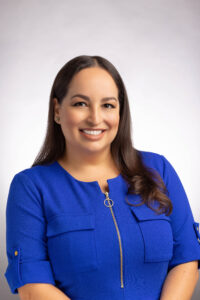
Erica Rodriguez Kight
“Our first year made it clear that collaborative journalism works, and we’re ready to take on elections coverage – made possible by the support from Collaborative Journalism Resource Hub and Central Florida Foundation,” says Judith Smelser, NCCF’s first task force chair and Central Florida Public Media’s president and general manager. “Ongoing community support is essential to sustaining this unique journalism model and ensuring it can continue delivering impactful reporting year over year.”
NCCF has contracted with Erica Rodriguez Kight as a dedicated project manager to establish governance, coordinate communication across partner organizations and support community engagement efforts that bring residents into the reporting process. Erica is the assistant director for mass media at the Nicholson School of Communication and Media at the University of Central Florida, where she’s also an associate lecturer in journalism and media production. Her background includes reporting roles at The Bradenton Herald and ABC affiliate WCJB-TV and a reporting fellowship with Cortico AI.
“Collaborative Journalism Resource Hub provides comprehensive support to journalism collaboratives across the U.S.,” says Amy Maestas, director of Collaborative Journalism Resource Hub. “News Collaborative of Central Florida is the first of 20 collaboratives the Hub will support over the next five years to advance the field of collaborative journalism. NCCF is a strong and dedicated group of media and community organizations that are willing to evolve from a competitive mindset to collaboration as a commitment to bringing stronger journalism to their communities. We look forward to being a resource as they join the robust and growing practice of collaborative journalism in the U.S.”
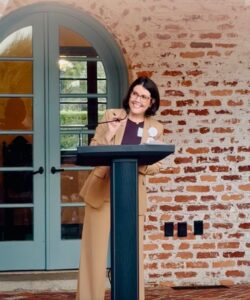
Beth Kassab
Central Florida Foundation serves as a convener, operational advisor and fiscal sponsor for NCCF and is an independent, trusted bridge builder across the journalism ecosystem. As the initial charitable investor in this emerging journalism model, Central Florida Foundation is proud to support local media coming together to better serve the region.
“This collaboration of journalists comes online at a critical moment, when Central Floridians are facing important decisions. By bringing together a more diverse group of journalists committed to helping residents understand what they are voting on, the News Collaborative of Central Florida plays an important role in strengthening our community,” says Mark Brewer, president and CEO, Central Florida Foundation. “Central Florida Foundation has a long history of supporting civic engagement, and local media is a vital pillar of a healthy, civically engaged region.”
The Winter Park Voice is contributing reporting and editing to provide resources and information to empower readers in Winter Park to be more engaged Central Florida residents.
“We know how much our readers value trustworthy news about their city and we are excited to bring them even more information about the 2026 ballots through the next phase of this partnership,” said Beth Kassab, editor of the Voice. “As a small nonprofit devoted to local news, we believe collaborations like this one are the way forward to keep credible, fact-based and independently-vetted information accessible to our community.”
Together, the media outlets participating in NCCF will be able to dig deeper into important local issues, cover more candidates and races and engage more community members.
WinterParkVoiceEditor@gmail.com
To comment or read comments from others, click here →

by Beth Kassab | Jan 7, 2026 | City Commission, News, Zoning and Development
Mixed-Use Development Proposed for DePugh Nursing Center Site
The new project by Z Properties will include commercial and residential elements on the prominent corner of Morse and Pennsylvania. The nursing center closed last year.
Jan. 7, 2026
By Beth Kassab
The Gardens at DePugh Nursing Center, which closed in the fall after 70 years, will be demolished and replaced with a “flexible, mixed-use environment offering modular opportunities to purchase space” along with a residential component, according to an announcement on Wednesday by Z Properties.
The Winter Park-based development and design firm led by Zane and Emily Williams said in a news release that the residential portion is still in the early planning. The commercial part of the development will look for a mix of “professional, creative, retail, hospitality and service-oriented businesses, with generous ceiling heights, thoughtfully-designed interiors and flexibility to support a range of uses.”
Zane Williams, who did not immediately respond to an interview request, acknowledged the prominence of the corner at 550 W. Morse Boulevard near Pennsylvania Avenue, and the potential for the new buildings to “set the tone” as visitors enter downtown Winter Park via Morse.
“Our goal here, as always, is to develop with intention and care, and to add beauty to our surroundings,” Williams said in the release. “This is a special corner, and we feel a responsibility to create something locals and visitors will pass by and think, ‘That feels right.’”
The new development will bring further change for the historically Black neighborhood west of Park Avenue that dates back to the city’s founding. The area has undergone significant gentrification over the past 25 years with the redevelopment of Hannibal Square and a number of larger homes replacing small, single-story houses.
The DePugh center opened in 1956 as the first state-approved nursing home where aging Black residents could seek care during segregation. The center was named for Mary Lee DePugh, who moved to Winter Park in 1937 to work for a white family she knew from the Chicago area and began advocating to provide health care to those in need as part of her work with the Ideal Woman’s Club, which she founded on the west side of the city. She died before the center opened.
Leaders of the Center decided to close it because of rising operating costs.
Z Properties applied for a demolition permit in October, said city Planning & Zoning Director Allison McGillis. The permit is likely to be approved because the building is not historically designated.
A representative of the firm said renderings of the proposed project will be available in the coming months.
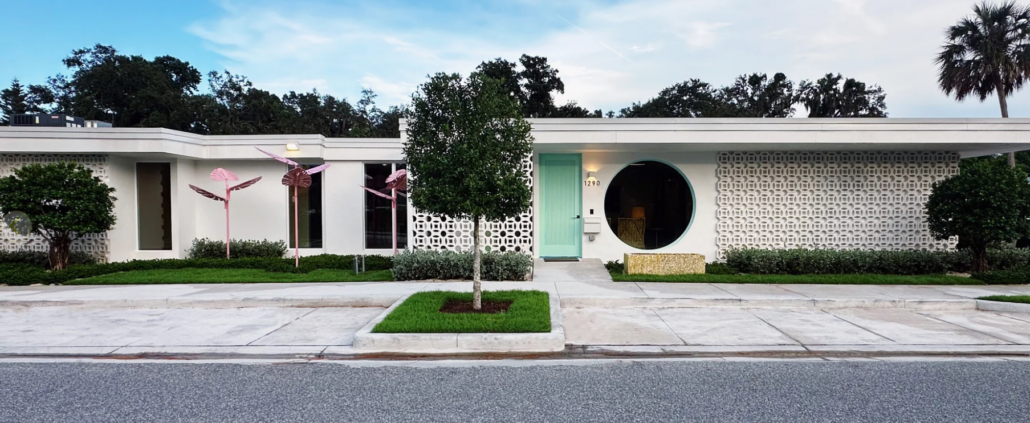
A portion of the Palmetto Grove work spaces by Z Properties near Seven Oaks Park. The project, which refurbished older buildings, recently won praise from City Commission members. (Photo courtesy of Z Properties)
Williams said in the release that one unique aspect of the plan will be the option for business owners to also own a physical space.
“There are so many business owners who dream of designing and owning their own building in the same way people dream of building their homes,” he said. “Ownership allows you to establish permanence, identity, and control of your space — this project is about making that a reality.”
Z Properties is partnering with Stream Realty on the development.
“It’s exceptionally rare to come across the opportunity to own custom-designed commercial space in Winter Park,” Darryl Hoffman, executive vice president at Stream Realty, said in the news release. “We’re thrilled to partner with Zane on this first-of-its-kind development for the area.”
Z Properties recently received praise from the City Commission related to its makeover of workspaces near Seven Oaks Park known as Palmetto Grove along Palmetto Avenue. The buildings were refurbished to have an elevated, high-end look not far off of Orange Avenue where the city is working to improve one of its gateways.
The release said the team is aiming for completion of the project on the DePugh site in 2027 and will unveil its name and more details in the near future.
WinterParkVoiceEditor@gmail.com
To comment or read comments from others, click here →











Recent Comments